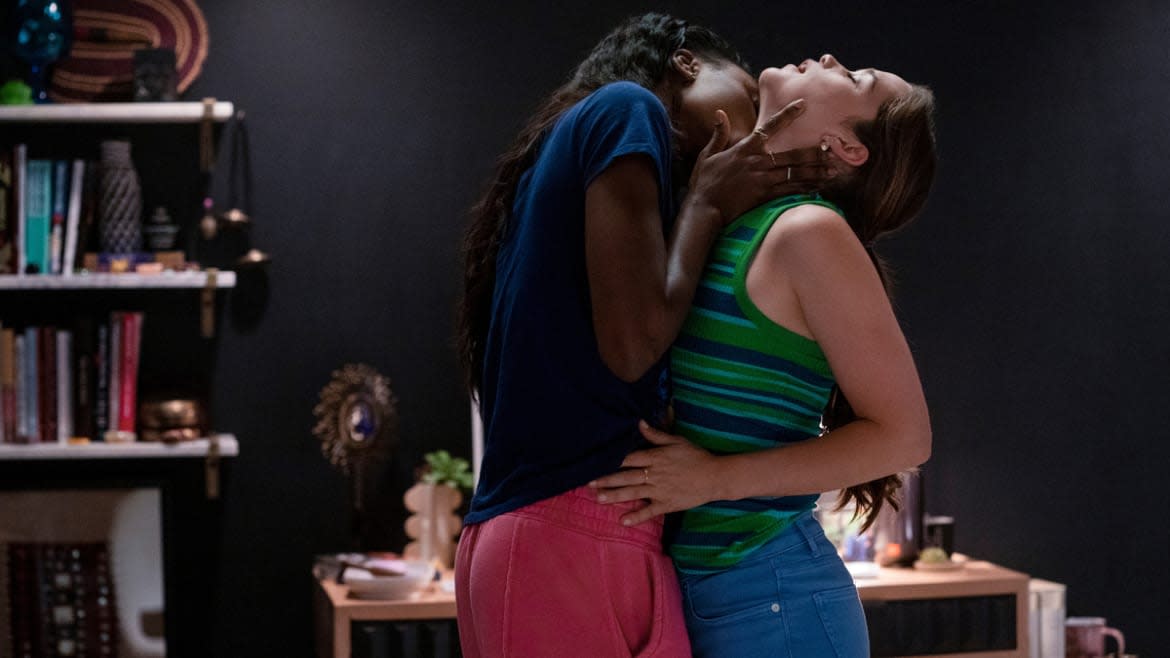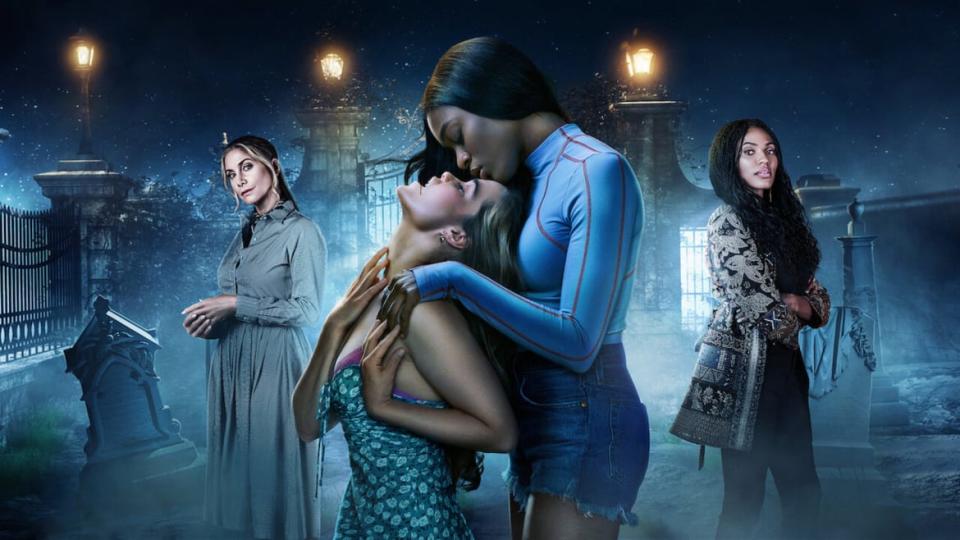‘First Kill’ Is a Teen Lesbian Vampire Romance That Really Kind of Sucks

Five episodes into a painfully rote first season, Netflix’s First Kill finally surprises with something truly perverse: a vampire unhinges his jaw and devours his mother-in-law. Moments later, when his wife asks where her meddlesome mom wandered off to, Sebastian Fairmont is forced to break the news: “My love, um...I, uh, ate her.”
“You ate my mother? I didn’t even know that was possible.”
Reader, neither did I.
It’s not that the carnage was shocking. In this show, livers and spines get ripped out Mortal Kombat-style with fair regularity. Instead, it was the surprise itself that startled. After five episodes of well-worn fanfic tropes and CW-style haughtiness, the self-aware silliness of the moment was a welcome change of pace for a series that often takes itself way too seriously.
First Kill sinks its fangs into a classic star-crossed romance between an ambitious teenage demon hunter, Calliope “Cal” Burns (Imani Lewis), and a good-hearted vampire named—[deep breath]—Juliette Anastasia Atwood Fairmont (Sarah Catherine Hook). Cal’s family have been guild-trained to fight monsters for generations, and she’s eager to prove her worth as a hunter by making her...well, you know. Falling for her prey was not part of the plan, but you know how these things go.
How ‘Evil’ Birthed TV’s Funniest Brood of Daughters
The unplanned connection is pretty inconvenient for Juliette, as well. A born “Legacy” vampire, she’s been trying to avoid taking her first life and assuming her birthright. (More on that proud family tradition later, but know this: they date back to the Garden of Eden and their lore involves a magical snake called the “emerald Malkia.”) In practice, this means that Juliette spends a lot of time popping blood pills, glaring into mirrors, and nursing pounding headaches. Symptoms of bloodlust migraines include a shift toward red lighting and the dull, distant hum of distorted electronic music.
Bottom line: it’s simply not a good time for Juliette to make out with a vampire hunter, or for Cal to swoon as a vampire gently scoops a bee off of her shoulder. (Emotional arcs involving bees—so hot on Netflix right now.) And yet, here we are. As the season wears on, First Kill’s story zooms out to encompass an ever-expanding cast of supporting characters—including Juliette’s best friend Ben Wheeler (Jonas Dylan Allen), Cal’s longtime friend Tess (singer MK xyz), and each of their families. In a fun bit of casting, Lost, V, and The Purge: Election Year star Elizabeth Mitchell plays Juliette’s mother, Margot.
If the tropes at the heart of First Kill sound familiar, that would be because they are. V.E. Schwab, who wrote the short story upon which the series is based, has described it as a response to the genre programming she grew up with—shows like Buffy the Vampire Slayer and Supernatural and Charmed, which “didn’t always love” their queer audiences back.
Fan culture lies at the edges of this show’s aesthetic; its show’s title theme, Stephanie Mabey’s “The Zombie Song,” directly name-checks “Edward and Bella” of Twilight. The opening credits mirror the vibe of fan-made ephemera, from character portraits rendered in hues that recall YouTube fan videos to sketches that look like they were scrawled onto notebook paper. And story-wise, First Kill is a Frankenstein’s monster of familiar tropes (cursed romance! lesbian vampires!), lore (vampires must be invited in!), and aesthetic flourishes (flared fangs!).
This is Gen Z and Generation Alpha’s take on the teen-vampire drama—Buffy or Vampire Diaries, through a Billie Eilish-tinted haze.
In some ways, First Kill does expand and improve upon the legacies of vampire fiction—particularly contemporary teen romances like Twilight and Vampire Diaries. Both of those properties maintained queasy relationships to the Confederate South as a source of nostalgia, and both sidelined Black characters. (That is, when they weren’t dying left and right.) Vampire fiction has also been a reliable site for the “bury your gays” trope—in which queer and queer-coded characters die at a disproportionate rate, often after revealing their sexuality or consummating a romance.
In this respect, one can give First Kill some credit. As hunters, Cal and her family are not only crucial to the proceedings but also in a unique position of power as they face down their bloodthirsty foes. Cal and Juliette’s queerness is apparent from the beginning but never remarked upon as a novelty or source of shame, and yes, they both survive the season until the end.
Unfortunately, this show kind of bites in every other way possible.
Like so many Netflix products—especially imitative simulacra like Ginny & Georgia, which place themselves in direct dialogue with their inspirations—First Kill clings to reference and bald exposition for dear life. The script does not trust its actors, so everything must be underlined at least three times through clumsy exposition. Our main characters’ treacly narration, especially, could pull a cringe from even the most stoic face. First Kill also shares Ginny & Georgia’s tendency toward awkward dialogue, especially in fight scenes. A choice example from this show: Juliette calls her sister “The Gaslight Queen.”
Production design, a crucial ingredient for any supernatural teen fantasy, also feels like a lost art here.
The Burns and Atwood Fairmont families have distinct tastes—the AF’s are pretty preppy, while the Burnses prefer high-end athleisure—but the world they share appears to have been designed with all the richness of a deodorant commercial. If Vampire Diaries relied too heavily on department-store fashions for its costumes, someone needs to have a talk with First Kill about its decorative addiction to Wayfair chic.
Perhaps the biggest disappointment: leads Sarah Catherine Hook (Juliette) and Imani Lewis (Cal) never bring enough heat to explain why their characters would risk it all. The script does its leads few favors, but even during wordless snogging sessions, the chemistry feels lacking. Cal and Juliette’s romance is far from chaste, but truth be told, no one in First Kill actually seems thirsty.
While I am certainly relieved that neither of these lesbians ends the season dead, don’t we also deserve a couple that, to borrow a word from Bridgerton’s lexicon, burns for one another? That said, even if our leads’ appetites are peckish at best, we do get one character who is delightfully, unabashedly hungry.

As Juliette’s older sister Elinor—yes, it’s actually spelled that way—Bumblebee actress Gracie Dzienny embraces her role as the very glamorous, somewhat scary foil. She’s the Spike to Juliette’s Angel; the Damon to her Stefan; the sassy, sequined answer to her mousey sister’s baggy sweaters and sneakers. She saunters through every scene, and she’s always ready to throw down. (And if you’re wondering whether by “throw down” I mean Elinor always wants to fight or always wants to party, the answer is...“yes.”)
While Juliette shies away from their family’s distinction as ancient, day-walking vamps, Elinor embraces everything she is. Dzienny’s perpetual pout and condescendingly bored disposition exhibit a mastery of the genre. More importantly, she seems to be the only person in the cast having a consistently good time. To Elinor, life’s an all-you-can-eat buffet—being a vampire simply means she can eat more.
If only every level of First Kill’s production had embraced that kind of zest. There are glimmers of fun—brief heartbeats when the series abandons its half-hearted stab at sincerity, making room for something more imaginative and human. For instance: an early-episode erotic fantasy in which Cal and Juliette wear cheap plastic ivy leaves and hash out their whole “I want to make out with you and also kill you” dilemma.
At its best, First Kill can feel like the CW’s Riverdale—a playful drama that delights in copious, conspicuous references and intentionally soapy character dynamics. Netflix’s series even takes a stab at social satire with an anti-monster group called M.A.A.M.—an apparent stand-in for QAnon and MAGA. (Thankfully, this does not take up too much real estate in the season.) Before long, however, it’s always back to the faux gravity. Leave it to Netflix to make a queer vampire drama that somehow doesn’t understand camp.
Get the Daily Beast's biggest scoops and scandals delivered right to your inbox. Sign up now.
Stay informed and gain unlimited access to the Daily Beast's unmatched reporting. Subscribe now.

